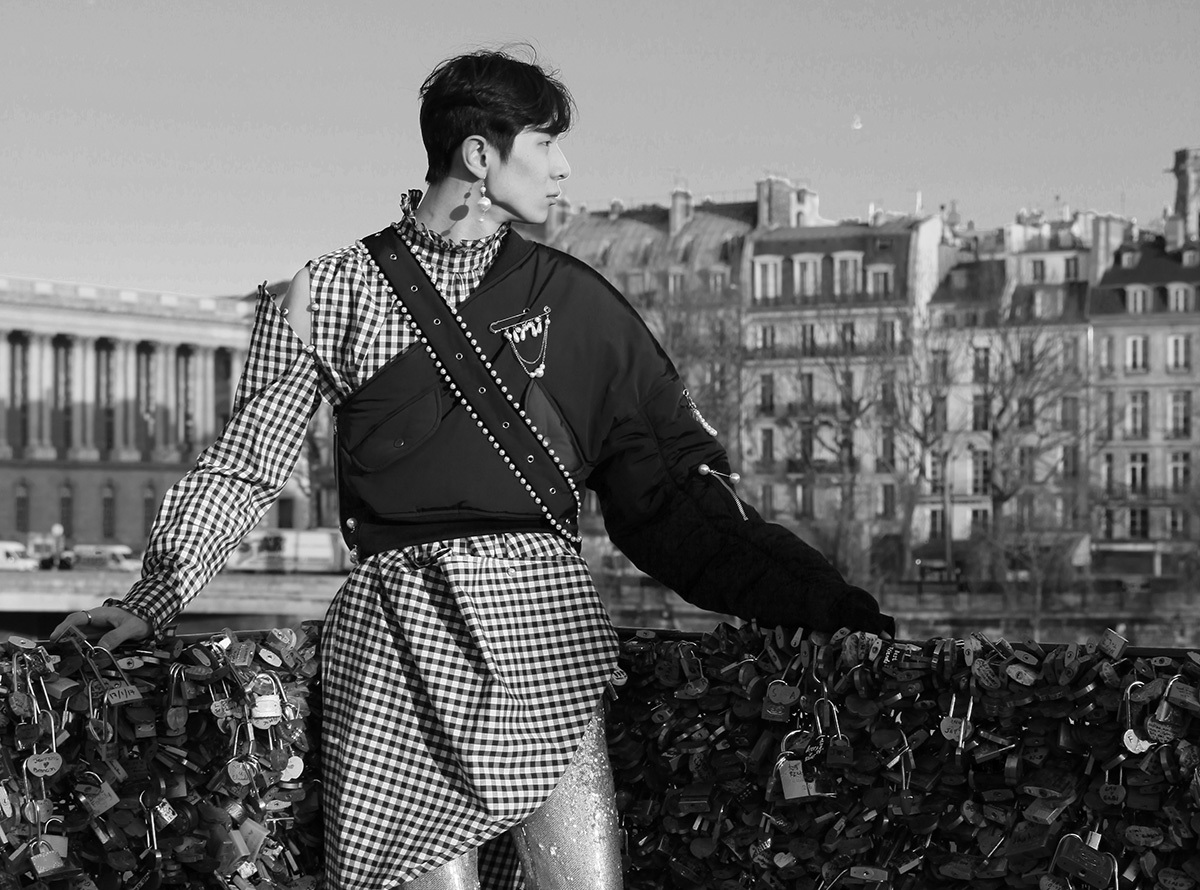When the semi-finalists for the LVMH Prize are presented to press and buyers this evening in Paris, a young couple from South Korea is going to be the center of attention. I first became mesmerized with their label Blindness nearly two years ago at a fashion show for emerging designers in Seoul. There was a kind of electric tension about their looks: slenderly cut leather trousers with a distinctly 90s minimalism about them were paired with oversized, opulent 18th century shirts with enormous bows down the back. It was magnetism and repellence all at once — poles meeting in a gender-bending voyage back to the future. Returning to Seoul in the seasons following that spring/summer 16 show, I witnessed firsthand the rise of Blindness and the thrilling courage that came with it. Speaking to Shin Kyu Yong and Ji Sun, the modest and discreet designers behind the label, you wouldn’t think the exuberant and wildly sexual exhibitionism explored in their collections was dreamt up by this 28-year-old couple. “The reason I express non-gender is for the purpose of invading my own prejudice,” Ji tells me.
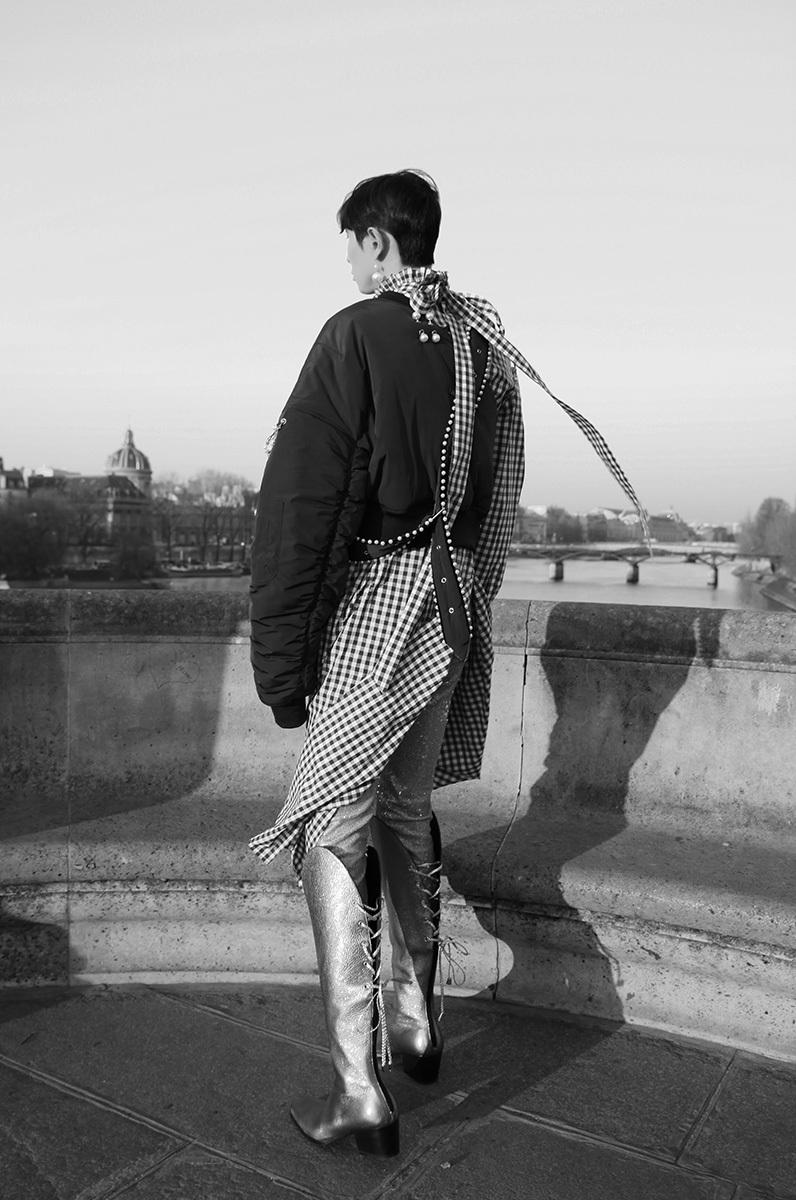
“I don’t want to become a person with a blocked mind. I express my thoughts stronger and braver in my design.” Polite and humble, the designers can hold a conversation in English, but for our first interview we’re sticking to email and the wonders of Google Translate. I’ve been wanting to ask Ji and Kyu some of these questions since I first started traveling to Seoul every season a few years ago; this grey city with the milky light and the hordes of immaculately dressed boys in their New Romantics looks, none of whom seem to frequent the flamboyant nightlife the international press and buyers always end up in when we’re there. How does it all make sense, this Korean affinity for avant-garde fashion and the don’t-ask-don’t-tell attitude towards sexuality, which Blindness so fearlessly convey through their work? “Korea is still influenced by Confucian culture,” Ji says. “There’s strong prejudice about masculinity and femininity. ‘A man shouldn’t be doing this! A woman shouldn’t be doing that!’ Men are obliged to serve in the military, so Korea has a lot of ‘manly’ prejudice. So when I see an elegant man, who’s showing his feminine side, my eyes are going.”
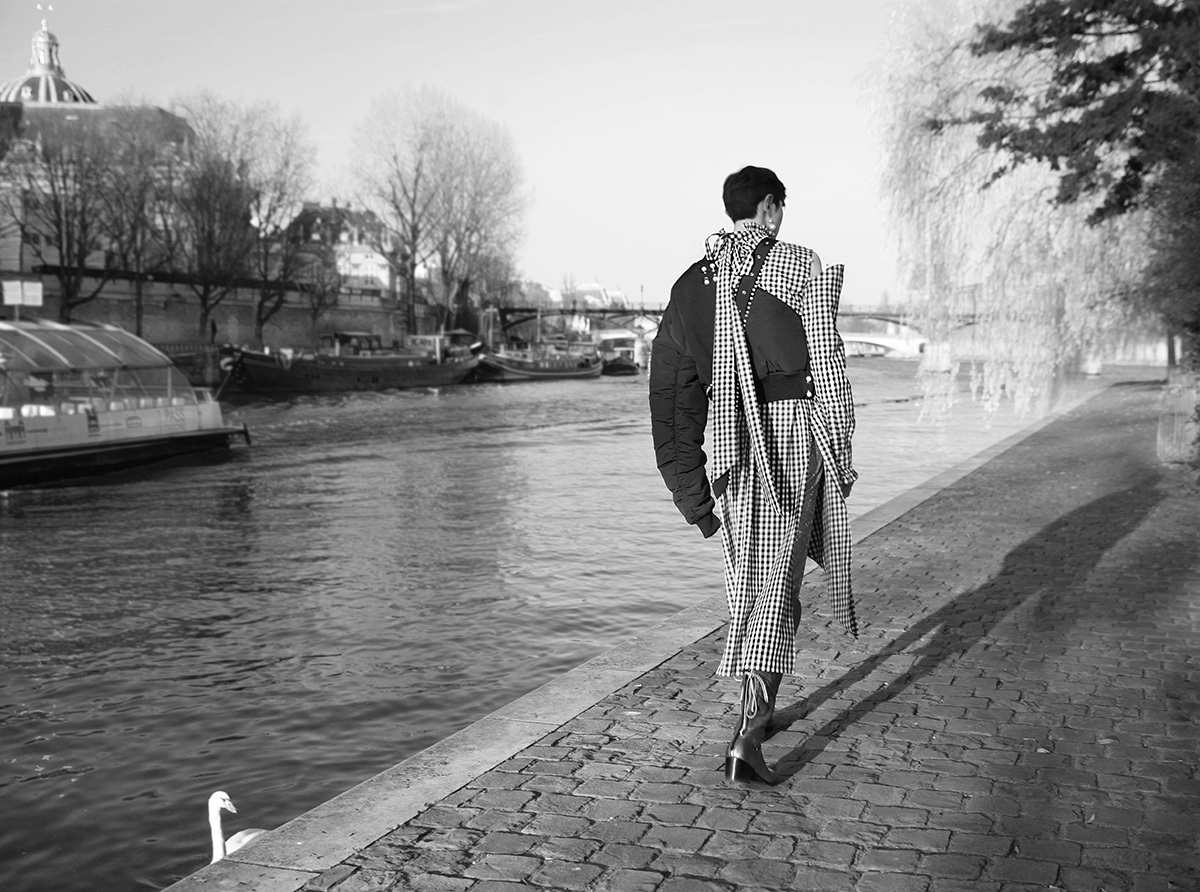
Like all Korean men, Kyu was enrolled for conscription for two years in his early twenties. “I lived a stereotyped life in the military. Conscription is a good thing, but it does establish the male stereotype in Korea,” he says, noting how army life eventually had the opposite effect on him. “After military service, I feel more equipped to visualize beauty and freedom of expression.” The Blindness designers were born in 1988 close to Seoul and grew up around and in the capital, both with ‘office-worker’ fathers and housewife mothers. Kyu played football and liked to make things. After conscription he grew tired of the engineering degree he was taking and enrolled at a fashion school in Seoul from which he graduated in 2013. A curious child, Ji excelled in pastime activities from piano to Taekwondo and swimming. “I was a maniac who loved comic books and Studio Ghibli animation,” she recalls. They were shaped by an achievement-oriented Korea, which had experienced its first gold rush in the 60s and 70s thanks to technology pioneers like Samsung and LG. In the 90s, K-Pop would become the country’s new prestige industry before Korea set its sights on conquering fashion — an ongoing mission.
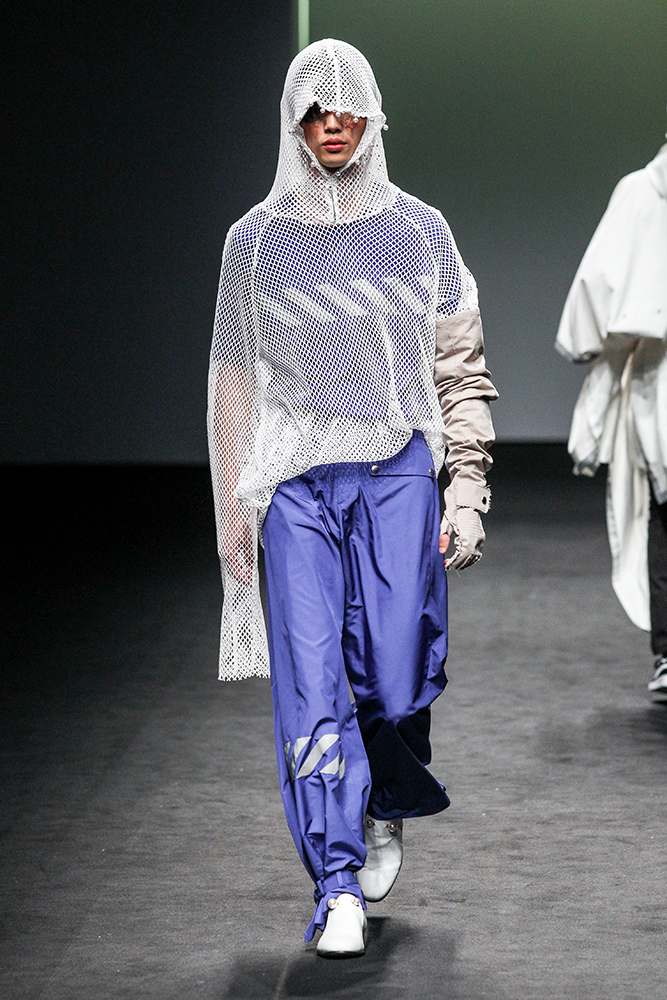
But being young in 90s Korea was also marked by financial panic. “We faced IMF growing up,” Kyu recalls, referring to the financial crisis that hit the country in the late 90s, named after the multi-billion loan Korea obtained from the International Money Fund, which would inadvertently increase the country’s westernization. “Foreign culture came in, and popular culture started having more appeal,” he tells me. These days, Korea is as western as you get in the Far East, although you can still find loopholes in Ji and Kyu’s frames of reference. Over lunch in Milan this January, for instance, I realized they didn’t know who Cher was. I showed them a picture from Turn Back Time, warning them I was about to change their world as they knew it. That evening they went back to their hotel and spent the night on YouTube. In the early 00s, Kyu saw the work of Raf Simons and Hedi Slimane and decided fashion would be his means of expression. Ji had graduated with a furniture design degree from Hongik University in 2011, and had a thing for functionality. In 2013, Kyu founded the label as commercial brand. After being introduced by a friend in 2015, Ji joined him and Blindness as we know it was born.
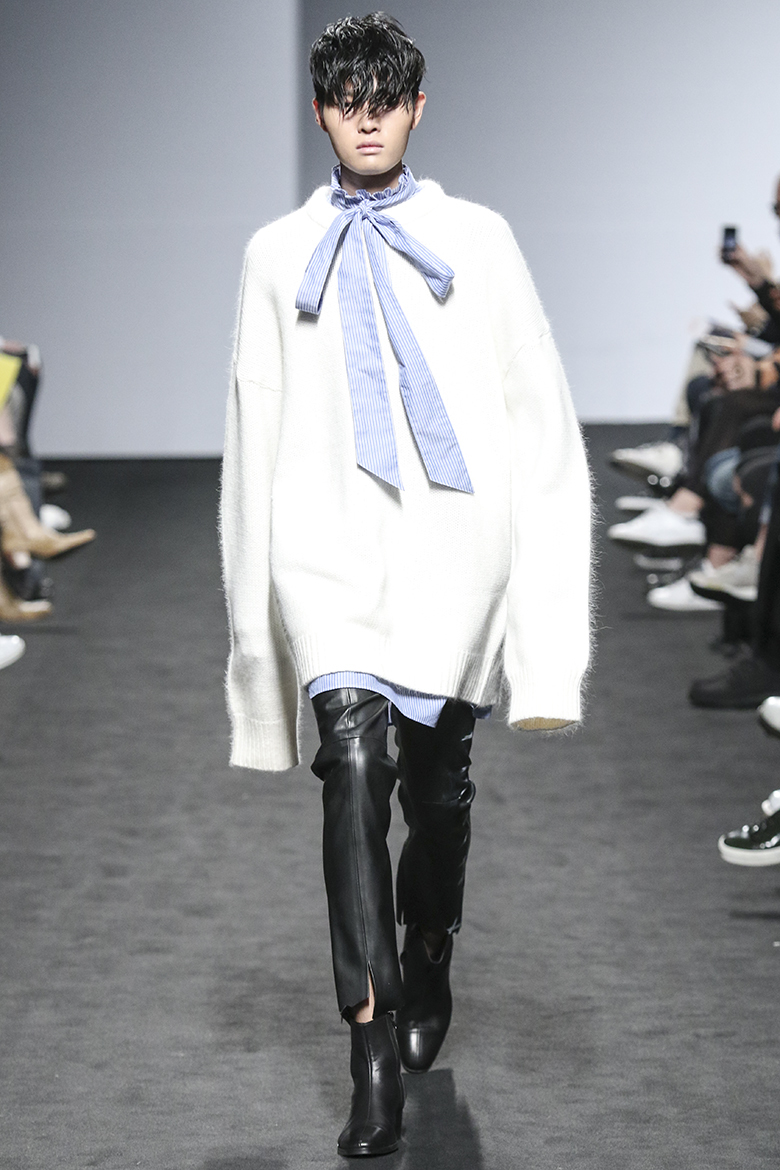
“Rather than the dictionary definition, to us ‘blindness’ means never to lose one’s mind, and never being tempted by anything,” Kyu explains. Characterizing their aesthetic isn’t something they do, choosing instead to let “Blindness be affected by the everyday conversation,” as he says. And while the eccentric exuberance of their menswear is a huge contrast even to Seoul’s progressive street style, the brand is still Korean at heart. “We really want to reflect Korean culture. For instance, our long flowing ties on the frill shirts are similar to the ribbons on Korean Hanbok coats,” Kyu points out. “We’d like to express Korean culture though fashion, but we would also like to design more progressively towards the goal of globalization.” Their spring/summer 16 collection was a cross-cultural, hyper-historicist feast for the eye: medieval chainmail sportswear and disco streetwalker boots on boys, with tech-y sculptural bomber jackets adorned with princely pearls and piercings like some futuristic Velasquez portrait. “We mainly get inspired from film,” Kyu says, but the Blindness designers also share a passion for interiors — something easily detectable in the way they practically furnish a look, every clashing element placed with a precision that makes it work.
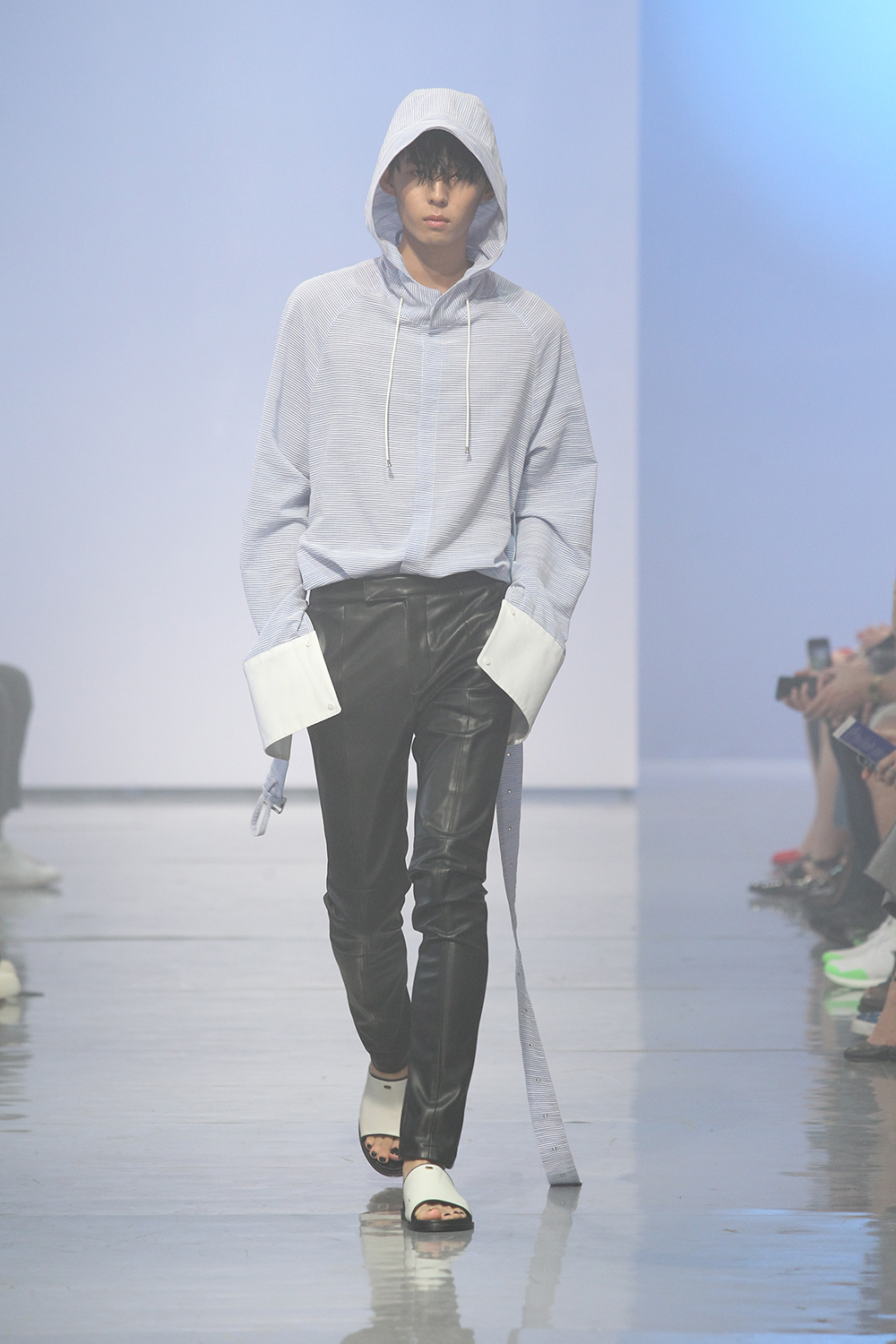
On my visits to Seoul during the city’s fashion week, I’ve often been more fascinated with what went on outside the show venues than inside. And the reason Blindness stood out to me was their reflection of the love of fashion I witnessed outside those shows — that sensory overload where garments can’t get crazy enough and there’s no such thing as over the top. At London Fashion Week last month, the British Fashion Council’s International Fashion Showcase board, which I’m part of, awarded The-sirius — an emerging young Korean menswear brand fronted by Younchan Chung — its very own show at Milan Fashion Week in September. The nod was symptomatic of the promising young talent coming out of Seoul’s fashion scene right now, and a precursor for LVMH’s announcement just a few days later that Blindness had been nominated for their prestigious prize. Whether Ji Sun and Shin Kyu Yong win or not, the recognition serves as a compliment to their work and a reminder of fashion’s responsibility to support emerging talent — also in the Far East. They may call themselves Blindness, but in these young designers I see a bright future.
Credits
Text Anders Christian Madsen
